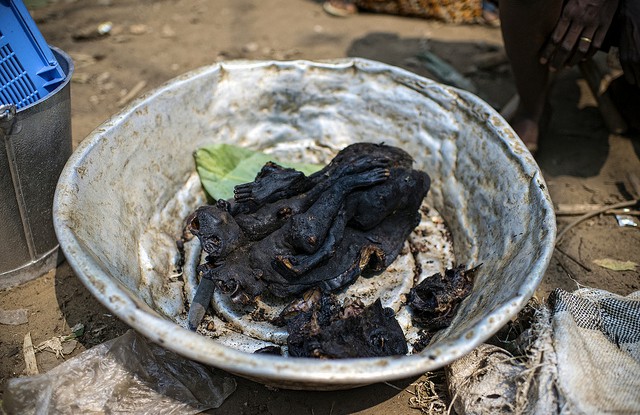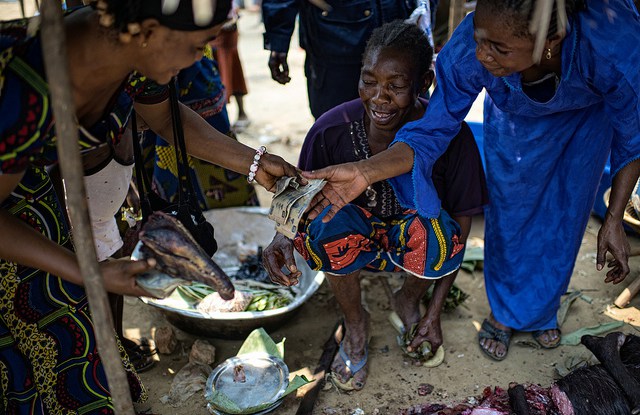
“Qu’ils mangent de la brioche”—Let them eat cake—is the phrase supposedly uttered by a great princess (though often attributed to Marie Antoinette) upon learning that France’s peasants had no bread.
This is a similar response, in our estimation, to what seems to be permeating from certain quarters with respect to the consumption of bushmeat and its links to the outbreak of Ebola virus disease (formerly known as Ebola haemorrhagic fever).
A number of opinion pieces have appeared in reputable magazines such as New Scientist and The Ecologist containing the suggestion that disease outbreaks from the Ebola virus could have been avoided if only people stopped eating wild meat. This argument is unsound. One of the reasons for this misjudgment has to do with what seems to be a general misunderstanding of human diseases, their origins, and what we have to do to live with them.
We currently know that between one-third and one-half of all human infectious diseases have a zoonotic origin, that is, are transmitted from animals. There is also evidence that since 1980, on average, one new emerging infectious disease (EID) has appeared in humans every eight months, most of them zoonoses originating from wildlife.
During the past decade, the highly pathogenic avian influenza strain H5N1 has received considerable attention as an EID with human pandemic potential. Currently, H5N1 virus does not transmit efficiently from person to person. However, to date, its most serious impacts have been on domestic poultry: millions of domestic birds have been killed by the infection, and more than 230 million birds were culled to contain the spread of the virus.
H5N1 has been reported in poultry from more than 50 countries, yet domestic broiler production does not appear to have been affected. In fact, annual poultry meat consumption per person for 2014 exceeds 40 kilograms (kg) in the Americas, compared with a global figure of around 15kg. In broad terms, worldwide chicken consumption is forecast to continue to increase for the foreseeable future as the global demand for inexpensive proteins increases, particularly among developing countries as a result of population growth and rising consumer incomes.
So, if the H5N1 case is anything to go by—and we could call it an insalutary combination of viruses and human food, just like Ebola and bushmeat—why are there no violent clamors to stop the consumption of chicken meat? In fact, there was no argument ever strongly raised during the outbreak of H5N1 to curb the consumption of fried chicken of certain iconic brands that are now found even in the most remote places of the world.
And, of course, knee-jerk reactions are never correct. Hence, any embargo on chicken meat would have been precipitate and nonsensical, even though people have died (with case-fatality rates likely lower than the reality, given the possibility of significant underreporting). This is not to say that the more severe impact of Ebola on wildlife and people should be underestimated in any way.
A DOUBLE STANDARD
But we seem to have different criteria applied when we discuss African wildlife. Infectious agents in foodstuffs occur anywhere in the world; recall the constant watchfulness we have to keep to abate the impact of bacteria such as Salmonella and Campylobacter, viruses such as Norovirus or Hepatitis A virus, parasites such as Trichinella or even the prion-mediated Bovine Spongiform Encephalopathy (BSE) in cattle transmitted to humans through consumption of contaminated meat.
The presence has not stopped anyone in Europe or the Americas from consuming as much as they want of whatever they want. The occurrence of food-borne zoonoses in most developed countries is monitored and analyzed annually by the relevant authorities, and actions are triggered as necessary.
So, why are we insisting that Africans do away with consuming wildlife? We know that eating bushmeat—unlike, for example, handling an uncooked animal carcass—is not the route for transmission of Ebola to humans. Hence, educating consumers and hunters of health risks, while instituting mechanisms for sanitizing the final product, could still permit the use of what is a valuable source of protein for many. Estimates of bushmeat consumption in the Congo Basin is more than 4 million tons per year—meat that is actually used to feed close to 100 million people. Achieving sustainable harvest of bushmeat is therefore a necessity, and by far the best available option compatible with biodiversity conservation, local livelihoods, food security and food self-sufficiency.
Banning and strictly enforcing the sale of endangered or at-risk species in urban markets—but allowing the continued sale of resilient species in rural areas—must remain a priority. And, for the sake of humans, adequately safeguarding food safety and animal health-related aspects of zoonotic diseases risks will guarantee the highest level of consumer protection and animal health.
Only this way can we put the issue of wild meat in Africa into perspective. Espousing dogma, which advocates a wrong-headed ‘Fortress Conservation’ mentality where animals are the sole purpose for the entire continent, is tantamount to uttering the French noble’s infamous words, ‘Let them eat cake’.
Robert Nasi is Deputy Director General of the Center for International Forestry Research (CIFOR). John E. Fa is a visiting professor of the ICCS group (Conservation Science) at Imperial College London.
We want you to share Forests News content, which is licensed under Creative Commons Attribution-NonCommercial-ShareAlike 4.0 International (CC BY-NC-SA 4.0). This means you are free to redistribute our material for non-commercial purposes. All we ask is that you give Forests News appropriate credit and link to the original Forests News content, indicate if changes were made, and distribute your contributions under the same Creative Commons license. You must notify Forests News if you repost, reprint or reuse our materials by contacting forestsnews@cifor-icraf.org.

